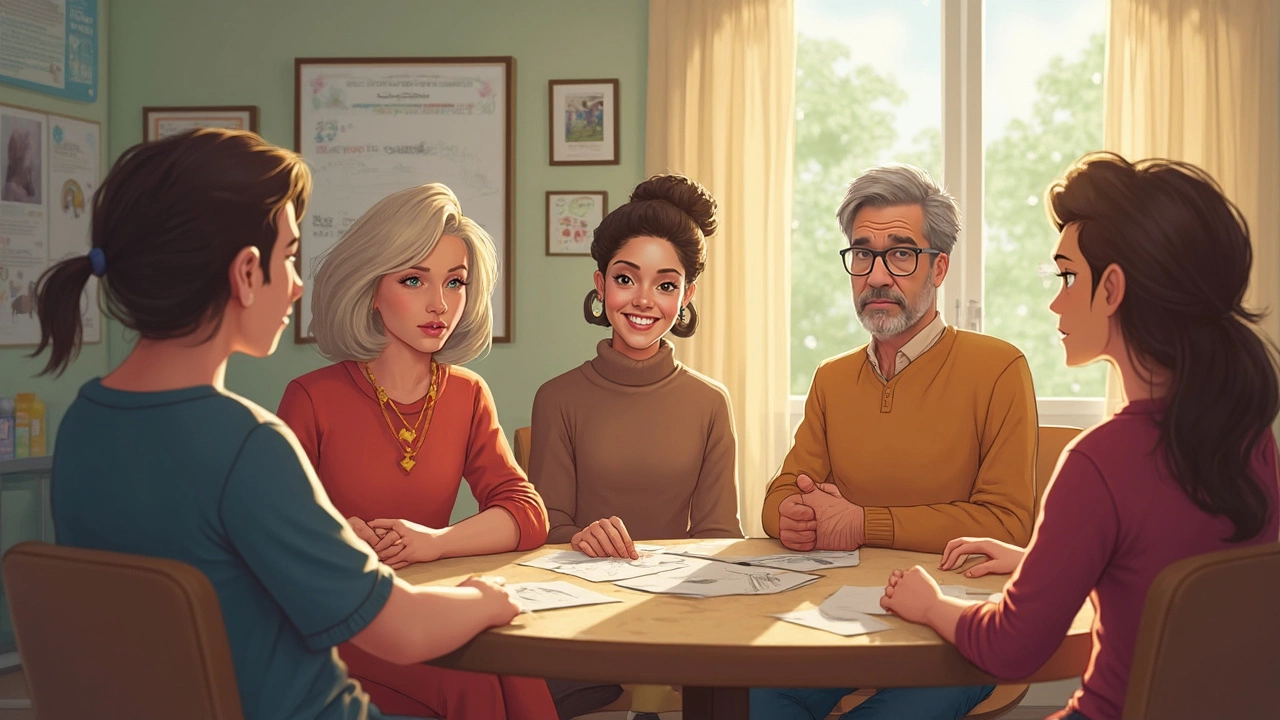“You already know enough about sex—why keep learning?” That assumption couldn’t be more wrong. The truth is most people’s real sex education ends just when things are about to get interesting. Sex is a massive part of adulthood and yet, so many adults operate with half-truths or outdated ideas. Some still think good sex is all about technique, others believe myths picked up from friends or movies, while many never talk honestly even with their own partners. What if adult sex education could be your secret power—not just for better pleasure, but for boosting confidence and strengthening relationships? Let’s dig into how embracing lifelong learning about sex could seriously level up your life.
Sex Isn’t One-and-Done: Why Basic School Sex Ed Isn’t Enough
Anyone who remembers their high school sex ed class probably remembers two things: how awkward it was, and how basic the info seemed. Let’s be real—most formal sex education focuses on how not to get pregnant and how to avoid STIs. Actual sex—the stuff you’ll deal with in real life as an adult—barely gets a mention. The world changes, your needs evolve, and the rules about relationships, bodies, and consent look completely different in adulthood than they did at 16. But hardly anyone talks about the learning curve after graduation. Think about it: by age 30, maybe you’re co-parenting, living with a partner, or navigating the world of dating apps. Queer relationships? Non-monogamy? Sexual health past college? These topics barely get covered in the first place, yet they make up the real “curriculum” of adult sexual life.
And science backs this up. According to a 2022 survey by the Kinsey Institute, about half of adults said they wished they’d learned more about how to talk to partners about sex. Another study in "Sexual Medicine" found adults who sought out new sex education had higher satisfaction and less anxiety in their relationships. People aren’t just looking for mechanics—they want to know about changing drives, body changes, safe practices as an adult, and navigating modern dating. It’s like, you wouldn’t rely on the same cooking skills you learned at 15 for the rest of your life, so why should your sex life get stuck in the past?
Debunking Old Myths: Clearing Up Sex’s Biggest Misconceptions
The collection of myths most of us pick up about sex is almost comical—if it wasn’t so frustrating in real relationships. A lot of adults get stuck thinking stuff like “good sex should be spontaneous and perfect every time,” or “real men are always ready.” Newsflash: hormones shift as you age, stress levels skyrocket, and for women, menopause brings changes even most doctors gloss over. Young adults can get fixated on what’s ‘normal’, worrying if they do it too much or too little, or believing that only intercourse equals real sex. For LGBTQ+ folks, there’s an extra level of erasure since so much mainstream info simply doesn’t fit. Diving into adult sex education reveals how wildly different healthy sex can look from person to person and season to season.
This isn’t just about clearing up confusion, it’s about unlearning shame. Shame can kill curiosity, pleasure, and even relationships. By seeking out more balanced, updated, and accurate info, adults can drop the myths, get realistic about expectations, and set themselves up for more honest discussions. It also gives you ammo to challenge harmful gender stereotypes, debunk the idea that desire only ‘counts’ if it meets a certain checklist, and makes it easier to communicate limits and needs—skills critical for happier sex lives. Next time you hear a friend say “married people have boring sex lives,” you can counter with data: A recent study by Stanford University found couples who regularly tried new things or learned together about sex had more frequent, satisfying sex than those stuck in old routines.

How New Knowledge Can Transform Your Sex Life and Relationships
Sticking with sex-ed as an adult isn’t just about correcting old mistakes, it’s about opening up new possibilities. Most people want to feel desired, respected, safe, and understood—but getting there isn’t automatic. Learning about communication styles, body diversity, and different forms of intimacy can be game-changing. Imagine you pick up a book on sexual communication or check out an online seminar on pleasure anatomy and suddenly realize something simple you’ve been missing with your partner for years. That’s not rare. According to sex therapists, couples who make space for learning—whether through workshops, books, or even sessions with knowledgeable sex workers—can break through barriers they never thought possible.
It’s not only people in long-term relationships who benefit. For people navigating single life or dating (especially in cities buzzing with opportunity like London), staying updated about sexual health and pleasure is vital. Knowing modern safety tips, consent cues, and how to talk about STI status isn’t just smart—it’s about respecting yourself and others. In my own friend group, the most confident daters are the ones who keep seeking out real info, rather than falling back on gossip or unreliable sources. They’re not afraid to ask new partners tough questions. This attitude ends up making sex not only hotter, but also safer and more connected.
| Learning Method | Reported Satisfaction Increase (%) |
|---|---|
| Attending Workshops | 68 |
| Reading Books | 54 |
| Talking to Professionals | 73 |
| Trying New Activities with London escorts | 62 |
One thing you notice right away: people who spend time learning about their own erotic interests—maybe exploring fantasies, trying kink responsibly, or practicing mindful touches—tend to report less shame and more agency in bed. Adults can expand their sexual menu just by ditching the script they were handed years ago. Plus, if sex ever feels stale, learning something new together can flip the script. Trying a class in tantric techniques or even a basic massage lesson? That’s a recipe for intimacy and teamwork, two things every couple could use more of.
Facing Change: Sex, Bodies, and Relationships Over Time
One of the trickiest parts of adult life is that nothing stays the same, especially when it comes to your body and relationships. Pregnancy, aging, health issues, new medications, heartbreak—all of them affect desire and ability. Menopause, in particular, is still wildly under-discussed given how many women experience it, with symptoms ranging from dryness to shifting libido. Lots of men feel embarrassed about changing erections, not knowing support is out there. Meanwhile, anyone who’s single, divorced, or switching up relationship styles may suddenly face a learning curve that feels overwhelming. Continuing your sexual education means you aren’t blindsided by these changes—you’re ready to adapt and advocate for yourself.
Another thing rarely discussed is disability and chronic illness. Millions of adults live with conditions that shift the definition of sex, intimacy, or ‘normal’ bodies. When adults get fresh information—whether that’s through books, therapists, or communities—they’re more likely to find solutions and joy rather than frustration. Good sex education focuses on pleasure, communication, and creativity, not just robotic performance. There’s a whole world of adaptive tools, positions, and resources out there that most people only find because they kept digging for answers well past their twenties.
Strikingly, people who view learning about sex as a lifelong practice often report feeling less isolated when things get tough. They’re more willing to reach out for help, experiment safely, and support others. Rather than seeing changes as signs of failure, they treat them as new chapters—yet another opportunity to grow, connect, and discover pleasure on their own terms.

Actionable Tips to Jumpstart Your Adult Sex Education
So where do you start if you want to level up your sex IQ? First, ditch the shame and give yourself permission to be a lifelong beginner. There’s no ranking—no one gets an “A” in sex for memorizing moves. Curiosity is sexier than pretending to know everything. Here are some beginner-friendly, genuinely helpful ways to learn more about yourself, your partners, and sexuality in general:
- Seek out books by contemporary sex educators, not just academic or medical texts. Titles like "Come As You Are" by Emily Nagoski and “The Guide to Getting It On” are packed with science but written for real people.
- Look for podcasts hosted by sex therapists or experienced educators. Hearing stories and expert advice is a low-pressure way to start learning.
- Take an online course or in-person workshop—it could be about anything from communication, to kink basics, to tantra. Learning together with a partner can bring you closer.
- Find safe ways to talk about sex in your circles. Try a monthly “sex and relationships” night with friends—swapping honest experiences can kill shame and spark ideas.
- Talk to professionals. Sex therapists, medical professionals, or even experienced sex workers or guides can help you explore interests or work through challenges.
- Explore trusted community resources if you’re part of the LGBTQ+ community. Real talk—there are amazing online spaces that address questions beyond the basics, without judgment.
- Stay up-to-date about sexual health. Don’t treat STI testing and birth control as “one and done” topics. Medical advice, tests, and treatment options change fast, and being informed keeps you— and your partners—safer.
- Be honest with your partner about what you want to learn, change, or understand. Sometimes just admitting “I want to try something new” is the biggest leap forward.
- Practice asking enthusiastic consent. It’s not just about “yes” or “no”—it’s about being in tune with comfort, interest, and pleasure, for both of you.
Start small, but start somewhere. If anything, adult sex education is less about racking up facts and more about building connection—with yourself, with your body, and with anyone you choose to share intimacy. With the right attitude, learning can transform what you thought you knew about desire, communication, and pleasure into something way more satisfying. Who says learning about sex is just for teens? The best chapters might still be ahead of you. If you want to find inspiration or expert guidance, even seeing how professionals like London escorts approach the topic can open your mind to new ideas. Give yourself the chance to be surprised—sex, after all, should never be boring.
